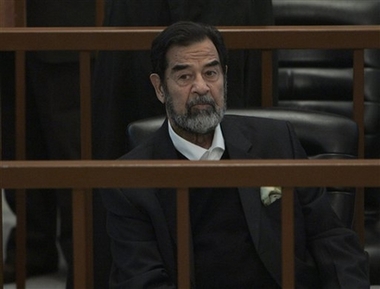Saddam no longer wants to go to hearings
(AP)Updated: 2006-12-06 09:16
AMMAN, Jordan - Saddam Hussein wrote the chief judge in his Kurdish genocide trial to tell him that he no longer wants to attend the hearings - whatever the consequences, according to a letter released Tuesday by former Iraqi leader's lawyers.
"I wasn't given the chance to speak when I tried to clarify the truth," Saddam wrote in the one-page letter dated Monday. He said he wanted to respond to the prosecution's allegation that he had stashed away $10 billion.
In Monday's hearing, an unnamed prosecutor asked al-Oreibi to freeze the $10 billion, saying it belonged to the former regime and had been deposited in foreign bank accounts. "We ask the court to put its hand on the money to secure the rights of the victims," the prosecutor said.
The judge did not respond and the hearing adjourned until Wednesday to hear more evidence.
The authenticity of Saddam's letter, sent out by his lawyers, could not immediately be verified. But it used language similar to what Saddam had often used in other statements, as well as in his courtroom speeches.
That included his use of the title: "President of the republic and the commander in chief of the Mujahedeen (holy warriors) armed forces" - the phrase he used to end Tuesday's letter.
Elsewhere in the letter, he wrote: "I feel disgusted. ... I will not accept being offended continuously by you and others."
He goes on to say: "Saddam, who taught pride and dignity to many people, refuses to attend (the trial) and be subjected to insult by agents and their followers ... Therefore, I ask to be relieved from attending the (court) hearings in this new comedy and you can do whatever you want," he wrote.
Saddam and six co-defendants face the possibility of execution if convicted for Operation Anfal. The prosecution estimates that 180,000 Kurds were killed when Saddam's army allegedly destroyed hundreds of villages, killing or making homeless their residents in a scorched earth campaign against separatist guerrillas in Iraq's northern Kurdish area.
On Nov. 5, Saddam was convicted in a separate trial in the slaying of 148 Shiite Muslims, including children, following an assassination attempt against him in the town of Dujail in 1982. He was sentenced to death by hanging.
A lawyer for Saddam said Tuesday he had appealed to an American court in an attempt to win a stay of execution in the Dujail case, arguing that the deposed leader's rights had been violated by American troops.
But a U.S. district court judge in the District of Columbia rejected the request Dec. 29 because the Italian lawyer is not a member of the D.C. bar.
If an Iraqi appeals court upholds the death sentence, Saddam could be hanged early next year, according to Iraq's chief prosecutor.
Even if a U.S. court were to rule in Saddam's favor, there is no indication that the Iraqi judiciary would apply the decision and stay the execution.
|
||
|
||
|
|

